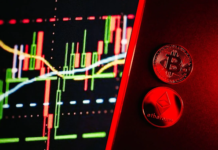[ad_1]
Catherine Coley, the CEO of Binance US, revealed that the coronavirus quarantine in Asia drove a surge in trade volume during an interview with Bloomberg on March 16.
On the subject of the recent correlation between Bitcoin (BTC) and the S&P 500, Coley asserts that both the traditional cryptocurrency markets are playing out a familiar long-term cycle.
She states that the markets are experiencing what she terms the “CRIC cycle” — where “crisis” yields a market “response,” followed by “improvements,” and then a return to “complacency,” before the cycle then repeats.
“So, in the regular traditional asset classes, as with Bitcoin, you’re seeing that complacency in the market turn into crisis, creating panic. That’s going to generate sell-off across the board.”
Bitcoin is resilient to real-world supply-chain shocks
She emphasizes that the cryptocurrency markets are underpinned by “technology that we can trade on 24/7, regardless of our environment,” describing the ecosystem as impervious to the “supply chain problems that we are seeing from national traded stock.”
“You also saw […] a resurgence of trading volumes taking place in Asia when the […] quarantine took place. So I think you will see the same thing happen in the U.S. when we get more firm guidelines on what the quarantine means for America.”
“I think you see Bitcoin being something that we can continue to engage with, regardless of the safety and concerns of the U.S. and globally,“ Coley adds.
Current BTC prices are “affordable” for institutions
Coley argues that the cryptocurrency ecosystem has matured significantly over the last year, adding that current prices may lure institutional investment.
“We’ve seen such a maturing from last year in this space, with institutions being able to identify who are really the players in the crypto space, and now the prices are now affordable for those institutions to come in.”
Binance US CEO: “markets are still trying to figure out what exactly ‘safe-haven’ means”
When questioned as to whether Bitcoin’s perceived status as a ‘safe-haven’ asset has been challenged by recent market volatility, Coley states: “I think that markets are still trying to figure out what exactly ‘safe-haven’ means.”
However, Coley predicts that Bitcoin’s lack of dependence on the physical world will see it continue to trade with strength despite global quarantine efforts and economic challenges faced amid the coronavirus threat.
Since launching in September 2019, Binance US has steadily increased the number of crypto assets listed on its platform. In March, the exchange announced support for Tezos (XTZ) and started accepting USD Coin (USDC) deposits.
[ad_2]










